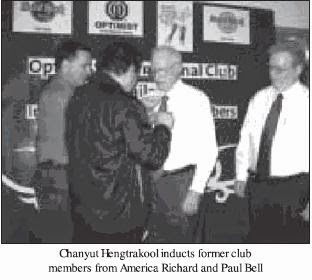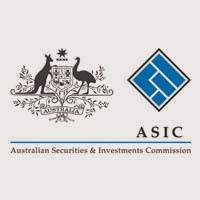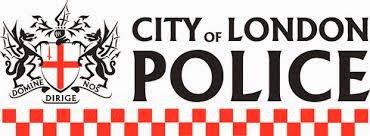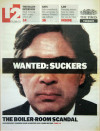 |
| We’re only surprised that Bell was not Knighted in the Knights of Rizal of given an UNESCO Cross! |
Boiler room scammers from throughout the world are now tuning into an internet site dedicated to exposing the activities of the ‘Wolves of Bangkok’.
The site has been getting numerous visits from Spain, Cyprus, and Eastern Europe, all favourite ‘boiler room’ locations but today the site concentrates on the companies of one American, Paul Richard Bell, aka Dr. Richard King, his boiler room operations, and his registrations in Hong Kong where a lot of the boiler rooms bank.
Bell is actually a convicted boiler room scammer. In 2001 – the same year Thai police made a number of raids on boiler rooms in Bangkok’s central business district – he was arrested in Brisbane, Australia, and pleaded guilty to 21 charges relating to his activities running ‘cold-calling’ companies out of Thailand and the Philippines.
But all that happened to him was that he was given two suspended six month prison sentences and fined AUS$12000.
 ‘This outcome shows that ASIC is determined to pursue share cold-callers who come to Australia, in addition to assisting Asian regulators shut down and prosecute share cold-callers in their countries’, ASIC’s Executive Director Consumer Protection, Peter Kell said afterwards.
‘This outcome shows that ASIC is determined to pursue share cold-callers who come to Australia, in addition to assisting Asian regulators shut down and prosecute share cold-callers in their countries’, ASIC’s Executive Director Consumer Protection, Peter Kell said afterwards.
Of course the statement by ASIC was total bull. Recent events have shown they are totally incapable of acting as a financial watchdog.
In 1992 Mr. Bell was fined $100,000 and had his registration under the US Commodities Exchange Act permanently revoked, for similar offences – something ASIC did not appear to be aware of.
When that happens – these people turn to Bangkok.
 In 2008 the City of London Fraud Squad broke up a meeting hosted by Bell promoting his Hong Kong-based ALV Group, a broking firm that had been the subject of warnings by watchdogs in Portugal and Sweden and arrested three people.
In 2008 the City of London Fraud Squad broke up a meeting hosted by Bell promoting his Hong Kong-based ALV Group, a broking firm that had been the subject of warnings by watchdogs in Portugal and Sweden and arrested three people.
I cannot trace what happened to them
But his most famous investment vehicle was International Asset Management that cheated investors around the world.
Paul Richard Bell was among several boiler room scammers who joined the ‘Pattaya Optimists’ former by American Drew Walter Noyes. The club however was removed from Optimists International after #DrewNoyes failed to pay their fees.
Paul Richard Bell has recently been reported to have passed on to the big bank in the sky.




Where is the bankers liability in all this? None of these major scams or corruption could take place without the collusion of the bankers. Whether it be politicians or these parasites grifting off the backs of their victims, do the bankers really think they can get away with saying they have no idea of where or how the cash was earned? An article in today's Age in Melbourne Australia reveals just what the Commonwealth Bank has been up to. As for ASIC, you'd be hard pressed to find a bigger bunch of seat shining, do-nothing mirror men than those guys. "We'll be looking into it" is their catch-phrase. We'll all be dead and buried before they ever launch a successful prosecution that leads to a stiff penalty. In the case below it looks like the jacks did all the heavy lifting to get the charges laid while did bank spent its time arse-covering. This is just so typical. The question is, where the f### was ASIC? Sitting on their overpaid arse's as usual.
Today's story-
The Commonwealth Bank repeatedly ignored evidence of an alleged $100 million fraud that implicated its own staff, and instead, seized the homes of victims in a bid to recoup its losses.
Fairfax Media can reveal the CBA allowed the alleged architects of the scam, Bill Jordanou and Robert Zaia, to continue to broker tens of millions of dollars in loans after failing to heed the findings of an investigation by the bank’s internal fraud division almost seven years ago.
The failure to act on the information raises serious questions about the CBA’s culpability in the losses and its decision to continue to seize the homes of Victorian families that police have identified as victims.
Mr Jordanou, Mr Zaia and three accomplices were charged last month with hundreds of counts of fraud and financial deception resulting from a decade-long alleged scam run from suburban accountancy firm Zaia Arthur & Associates.
Victoria Police’s fraud squad launched an investigation into the firm in late 2011 after the CBA reported loan applications lodged on behalf of clients that were supported by falsified documents.
The scheme allegedly involved taking out loans for property developments that were never started. While some of the money went for repayments to keep the loans out of default, most was allegedly siphoned off to fund a lavish lifestyle for the perpetrators.
But documents obtained by Fairfax Media show CBA’s internal fraud unit had investigated an incident as early as 2007 relating to Zaia Arthur & Associates’ alleged involvement in forging client cheques – more than four years before the bank approached police about the company.
About a dozen other banks and finance groups would also be allegedly stung, taking the total fraud to more than $100 million. Hundreds of allegedly forged documents were eventually uncovered by the fraud squad at the offices of Zaia Arthur & Associates during a raid in 2012.
But while the original fraud allegations are now seven years old – and the CBA reported its concerns to the fraud squad nearly three years ago – the bank has persisted in foreclosing on the homes of victims.
CBA is seeking seizure orders in the Supreme Court for at least four properties despite the owners being identified as victims by police in criminal cases to be prosecuted in the Magistrates Court later this year.
But Fairfax Media can also reveal that fear of public exposure has seen the bank back off one foreclosure bid and try to shift blame onto Zaia Arthur & Associates as a defence in another pending lawsuit.
An attempt to repossess the home of a 91-year-old woman caught up in the rort was abandoned last year when her family threatened to sue the CBA for damages. ‘‘We were told that the bank didn’t need this kind of exposure and we could get the title back to her house if we signed a non-disclosure agreement,’’ a victim said.
In a 2013 lawsuit brought by another victim, the CBA has recently amended its defence to claim that the bank’s financial liability should be limited due to the actions of Zaia Arthur & Associates.
The inconsistency in the CBA’s responses to victims – and the alleged involvement of a bank insider that was crucial to making the scheme work – has left victims shocked and angry.
‘‘Altogether, my family probably has 120 years as customers of the CBA and that’s why we felt so comfortable with them,’’ a victim said.
‘‘We just couldn’t believe that they would try to take our mother’s house when one of their own staff was involved and they’ve known for years that this has all been a scam.’’
A CBA spokeswoman refused to comment on the foreclosure cases.
“In regard to your questions relating to events in 2007, you would appreciate that there are currently fraud allegations regarding Zaia Arthur & Associates before the court and as such it is not appropriate for us to comment,” she said.
To read Australian media you have to first off all place a chip on your shoulder and blinkers on your eyes.